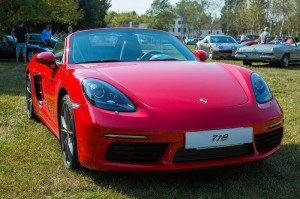« Articles
Electrifying Elegance: The Porsche 718 EV Revolution

Porsche, a name synonymous with high-performance sports cars, is steering into the future with its electrifying venture, the Porsche 718 EV. This move marks a significant shift for the brand, known for its roaring engines and unparalleled driving experiences. The anticipation surrounding the Porsche 718 EV is palpable, as enthusiasts and experts alike eagerly await to see how Porsche translates its legendary performance into the electric vehicle (EV) arena. This introduction to the Porsche 718 EV explores what we know so far about this exciting new chapter in Porsche's storied history.
Design and Aesthetics of the 718 EV
The Porsche 718 EV is expected to maintain a design language similar to its combustion engine counterpart, the iconic 718. This approach ensures that the EV variant retains the classic Porsche aesthetics that fans adore. A key innovation in its production is the "flexline" technology, which allows for a seamless integration of electric vehicle components while maintaining the car's signature look. Another critical aspect is the "E Core layout," a design choice that places the batteries strategically behind the driver but ahead of the rear axle. This layout not only mimics the weight distribution of the current Cayman and Boxster models but also enhances the driver's experience by allowing a lower seating position, thus improving the car's aerodynamics and overall performance.
Performance and Power Specifications

The Porsche 718 EV is set to redefine what an electric sports car can do. While specific details about its power range are still under wraps, comparisons with the Mission R concept suggest a formidable performance profile. The Mission R boasted an impressive all-wheel-drive system with significant horsepower, hinting at what could be expected from the 718 EV. Speculations suggest the possibility of different models, including a base rear-wheel-drive and an upgraded all-wheel-drive version, catering to various driving preferences and needs.
Innovative Charging Technology
Porsche's foray into electric vehicles brings with it groundbreaking charging technology. The 718 EV is expected to feature the 800-volt charging tech, first seen in the Taycan, which surpasses the standard 400-volt systems used by most manufacturers. Even more intriguing is the teased 900-volt charging technology, promising even faster charging capabilities. This advancement means that the 718 EV could significantly reduce downtime, enhancing the practicality and appeal of electric sports cars.
Expected Launch and Availability
The launch of the Porsche 718 EV is highly anticipated, with the automotive world keenly watching for its debut. Expected to hit the market in the near future, this vehicle is set to make a substantial impact. Discussions about market expectations and potential consumer responses are already underway, with many predicting that the 718 EV, alongside the Porsche Vision 357, will set new standards in the electric sports car segment. The excitement is building as Porsche prepares to unveil vehicles that could redefine the boundaries of electric mobility and performance.
The Porsche Legacy and Electric Future
Porsche's journey from producing iconic sports cars with roaring combustion engines to embracing the electric revolution is a testament to its commitment to innovation and excellence. The brand's history is steeped in a legacy of performance, luxury, and technological advancements. The introduction of the Porsche 718 EV marks a pivotal moment in this storied history. This electric variant is not just an addition to Porsche's lineup; it represents a significant leap towards the future of sports cars. The 718 EV embodies Porsche's vision of combining its renowned driving experience with sustainable technology, setting a new benchmark in the sports car segment.
Comparative Analysis with Competitors
In the rapidly evolving world of electric sports cars, the Porsche 718 EV enters a competitive arena. When compared to its contemporaries, the 718 EV stands out for its blend of Porsche's classic design ethos with cutting-edge electric vehicle technology. Its performance metrics, expected to be on par with or surpassing top competitors, place it at the forefront of the electric sports car market. The 718 EV's unique combination of speed, agility, and electric efficiency sets it apart, showcasing Porsche's ability to innovate while staying true to its heritage.
Environmental Impact and Sustainability
The shift to electric vehicles (EVs) is a crucial step in reducing the automotive industry's environmental impact, and Porsche is at the forefront of this change. The 718 EV represents a significant stride in Porsche's broader commitment to sustainability. By transitioning to electric models, including the anticipated 2027 Porsche K1, Porsche is not only reducing emissions but also setting a precedent for luxury sports cars' role in a more sustainable future. This move aligns with global efforts to combat climate change and signifies a more environmentally conscious approach in the high-performance vehicle sector.
Consumer Expectations and Market Trends
Today's consumers are increasingly aware of environmental issues and are seeking sustainable yet high-performing vehicles. The Porsche 718 EV meets these expectations by offering a no-compromise solution an electric sports car that delivers on performance, luxury, and eco-friendliness. It fits seamlessly into the current trend of electrification in the automotive industry and is poised to shape future market trends, especially among discerning buyers who seek the thrill of a sports car without the environmental footprint.
You may also like: Porsche Driver Experience in New Panamera: What To Expect
The Porsche 718 EV is more than just a new model; it's a bold statement about the future of driving. It encapsulates Porsche's evolution from a celebrated past into a sustainable, electrified future. The 718 EV is set to redefine the sports car market, offering an exhilarating driving experience powered by advanced electric technology. As Porsche continues to innovate and lead, the 718 EV stands as a beacon of the brand's enduring legacy and its commitment to shaping the future of the automotive industry.
Featured Video
The fastest Porsche 911 ever made | Turbo S
The Porsche 911 has a turbo boost button but you only have 20 seconds...

Comment using Facebook